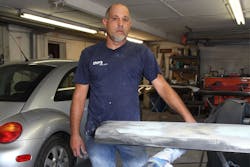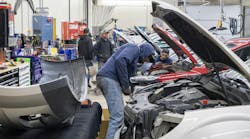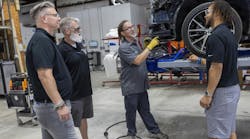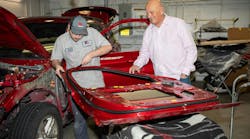Bob Kraft worked with his father at Kraft’s Auto Body in Columbus, Ohio, for nearly 30 years. They relied heavily on one another to ensure smooth operations at the shop: Kraft managed the shop floor while his father handled the administrative tasks. The duo made a great team, Kraft says.
But Kraft’s father became severely ill in February 2010. He unexpectedly passed away a little more than a month later. The entire business was suddenly left under Kraft’s control. That’s when the shop’s smooth operation got a little choppy, Kraft says.
Kraft knew next to nothing about how to handle the administrative side of the business. He had no idea when monthly and quarterly business taxes were due, when monthly bills were due, or even how to make bank deposits for the business.
Kraft says a lot of business expenses got paid late that year. The Internal Revenue Service (IRS) fined him more than $1,000 for failure to submit first quarter 2010 taxes by deadline.
“Those tasks were my dad’s thing,” Kraft says. “He was always the man in charge, and felt nobody else needed to know how to do it.”
Needless to say, Kraft was left with many questions and much frustrtion, which could have been avoided.
—Bob Kraft, owner, Kraft’s Auto Body
Many shop operators don’t have any plan in place to ensure the business will continue to operate smoothly in their absence, says James Spencer, president of Spencer Business Development. Too many owners put themselves in a position where they’re the only ones with the know-how to handle certain tasks.
That’s obviously a problem because most shop operators will experience a time—planned or unplanned—when they can’t be at the shop, Spencer says. If that absence happens to be for an extended period of time, someone must be able to cover their workload so the business doesn’t crumble. Without such a plan? The health and life of your company could be in jeopardy.
Plan for the Unexpected
You might be able to empathize with Kraft’s situation, but at the same time, feel like it will never happen to you. But really, an injury or illness could happen to anybody, anytime.
“Most people don’t like thinking about catastrophic scenarios,” says Bob McDonald, president of Summit Consulting International Inc. “It’s hard for shop owners to think about being put in a position where they won’t be able to operate their business.”
That thought process typically doesn’t happen until owners start thinking about retirement, McDonald adds. That’s exactly what happened to Kraft. His father received forms from his accountant that needed to be submitted to the IRS for first quarter taxes. He had every intention of doing so, but thought it could wait until he was feeling better and back in the shop. The forms sat idle on his desk.
It was such a short time period from when Kraft’s father became ill to when he died, Kraft recalls. The two never had time to hash out what things needed to get done and when. Those taxes never got paid.
“It’s a wise idea to have more than one person in your facility who knows how to do everything,” Kraft says, noting it took him an entire year to fully understand the business from an administrative perspective. “I wish I would have had much more know-how and understanding of the business before Dad died.”
Creating the Plan
A lot goes into operating a business, and it’s nearly impossible for someone without ownership experience to instantly know what to do.
That’s exactly why it’s necessary for shop owners to have a detailed plan. Let’s take a look at a few general guidelines to have in place to ensure your shop can keep its doors open if you’re ever away:
• Identify a successor. Every shop should have a “number two” employee in place who is capable of taking on the owner’s responsibilities, McDonald says. It should be someone who is established with the business and knowledgeable of shop operations.
You might not have any employees right now who you are comfortable handing the reigns to in your absence, McDonald says. Think about that during your next hire. Identify the traits and attributes needed to run your business. Look for applicants who have those skills, and groom them to fill your shoes.
• Write job descriptions. Your successor needs to clearly understand every employee’s job and duties within the shop, Spencer says.
Write a job description for yourself, too. Document your daily, weekly and monthly tasks so your successor has a clear outline of everything you do.
• Train your successor. “Bring your successor into the loop regarding everything that happens to make the business operate,” McDonald says. Cross-train them on every task. Involve them regularly in those processes so they can actually learn how it’s done, rather than just handing them a long to-do list with no explanation.
• Design budgets and bill-pay schedules. Your successor needs to know what bills need to get paid, when they are due and how much money is allotted for certain expenses. Create yearly budgets and bill-pay schedules so your successor can easily identify those things. You may also need to transfer bills into your successor’s name.
Learning from the past, Kraft now has a list posted in his office that tells him exactly when certain bills are due. Should anything ever happen to him, other employees have access to that list so they don’t have to scramble to figure it out on their own.
• Document critical information. Make sure your bank account numbers and passwords are documented. They should be secured with your accountant, attorney or successor, McDonald says. “Somebody should have ‘the key to the safe’ so they’re able to access bank accounts and financial records.”
• Have a second check signer. Shop owners should register a second check signer with their bank, McDonald says. This allows another person to oversee payroll and make purchases for the business. Meet with your banker to make those arrangements.
• Plan for tax time. Make sure someone has access to your tax records, and that all business information needed for tax preparation is easily accessible. Kraft suggests outlining on a calendar when monthly, quarterly and year-end business taxes are due so your successor isn’t left in the lurch to remember that on their own.
In addition, document the process you follow to pay taxes—whether you work with an accountant, third-party company or do it yourself.
• Ensure continuous measurement of business performance. All shop operators should be measuring key performance indicators (KPIs)—like gross profit, closing ratio, customer traffic and profit by insurance company, Spencer says.
Document all KPIs that are critical for your business to measure. Make sure your successor understands how to monitor those things, and the significance of doing so.
• Keep building relationships. Many shop owners build the reputation of their business through relationships they establish with fleet customers or insurance partners, McDonald says. Shop owners should involve their successors in those relationship developments to ensure they will continue.
• Transfer of ownership. Shop owners need to have a clear plan spelled out in case they become incapacitated, McDonald says, which could necessitate a transfer of ownership. A detailed plan ensures people won’t be left guessing what to do with your business.
Your plan should document who will take over ownership, and how the purchase price will be determined. Work with your accountant and attorney to determine that, McDonald says.
• Communicate with your staff. If you’re showing signs that you may not be with the business for much longer—like talk of retirement or deteriorating health—communicate your succession plan with employees, McDonald says. Give them a general overview of how the business will operate without you.
“That will give your employees confidence in knowing the business is ongoing, and that they don’t have to start looking for other jobs,” McDonald says.
Focus on Business Improvement
Even if you understand the importance of having a succession plan, you may not feel the sense of urgency to do so—especially if you’re in good health. But there are reasons for doing this beyond the possibility of experiencing a catastrophic scenario. Successful shop operators need to spend time away from their business from a planned perspective, too.
“It’s critical for owners to attend industry functions in order to gain knowledge on how to improve their business,” McDonald says. That might include attending industry events, getting involved with industry organizations, or attending management training courses. (Check out FenderBender’s August 2011 article, “Weighing the Benefits and Costs of Industry Involvement.” ).
Those activities might cause you to be away from your shop for up to a week at a time. And you don’t want to be forced to reach for your phone every hour to check in.
You can’t let your own shop responsibilities bog you down, McDonald says. “You need to have a leadership plan in place so you can allow yourself the opportunity to compete successfully and profitably in the industry today.”



